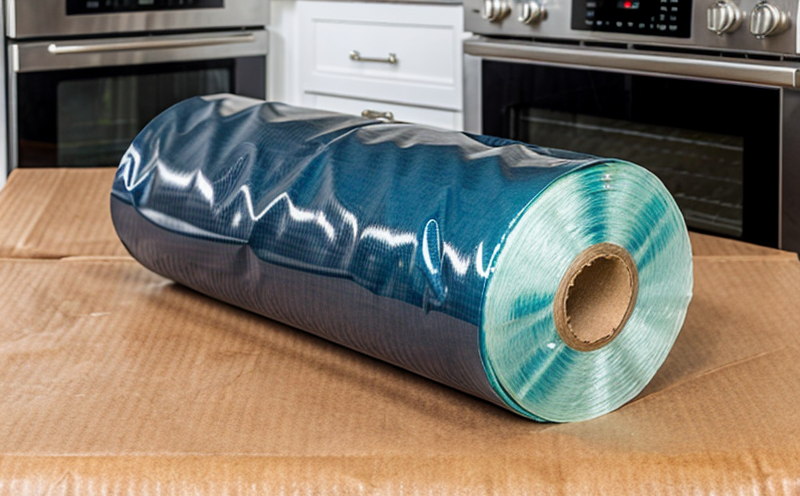EN 71-3 Migration of Elements Testing in Household Plastic Wraps
The European standard EN 71-3 is a pivotal document that sets out requirements and test methods aimed at ensuring the safety of toys and other materials intended for use by children under three years old. The specific section, Part 3: Migration of certain elements from plastic materials in contact with foodstuffs, focuses on identifying any potentially harmful substances migrating into food or drink containers made from plastics.
This testing is particularly important within the household wraps and covers category as these products often come into direct contact with consumables, especially food. Ensuring that no toxic elements such as lead, cadmium, or other heavy metals migrate into foods is paramount for both consumer safety and compliance with international standards. The test involves placing the plastic wrap in a solution simulating exposure to foodstuffs and measuring any migration of potentially harmful elements.
The apparatus used in this testing includes specialized equipment designed to simulate real-world conditions accurately, such as temperature control chambers, analytical balances, and chromatographic systems for detecting minute amounts of migrated elements. Compliance with EN 71-3 is essential not just for ensuring safety but also for avoiding legal issues, recalls, and brand damage.
Before testing, the samples are prepared by cutting them into standard sizes to ensure consistent results. The chosen specimen type depends on the specific plastic wrap being tested, whether it's a roll of wrap or a single sheet. Once prepared, these specimens undergo rigorous tests in various immersion solutions designed to mimic different foodstuffs and environmental conditions.
The acceptance criteria for this testing are strict and vary based on the type of plastic used and the intended use of the product. For instance, if the plastic is designed to wrap food directly, higher thresholds for acceptable migration levels will apply compared to a plastic cover used in a less direct contact scenario. The results are analyzed using advanced analytical techniques like ICP-MS (Inductively Coupled Plasma Mass Spectrometry) or GC-MS (Gas Chromatography-Mass Spectrometry).
Understanding the importance of this testing is crucial for quality managers, compliance officers, R&D engineers, and procurement teams. By ensuring that all products meet these stringent standards, they can help protect public health while maintaining regulatory compliance.
Why It Matters
The safety and well-being of consumers are paramount in the manufacturing industry, especially when dealing with household items like plastic wraps and covers. The migration of harmful elements from these materials into foodstuffs can have severe health implications for young children who might be more susceptible to such contaminants.
Compliance with standards like EN 71-3 is not just a legal requirement but also an ethical one. It demonstrates a commitment to producing safe and reliable products that meet the highest international safety standards. Non-compliance can lead to product recalls, financial losses, reputational damage, and even legal action. This underscores the critical need for thorough testing throughout the supply chain.
Moreover, beyond just regulatory compliance, meeting such stringent standards enhances brand reputation and customer trust. Consumers are becoming increasingly aware of safety issues related to household items, making it essential for manufacturers to demonstrate their commitment to quality and safety through rigorous testing procedures like EN 71-3 migration tests.
Industry Applications
Testing plastic wraps used in packaging food items meant for direct consumption by children under three years old.
Evaluating the safety of plastic covers designed to protect food containers from contamination during storage or transport.
Ensuring compliance with international standards when exporting products to countries that require EN 71-3 certification.
Verifying the safety of custom-made household plastics used in specific applications within the child care sector.
Eurolab Advantages
At Eurolab, our commitment to excellence extends beyond compliance; we aim to provide unparalleled expertise and cutting-edge technology. Our team of highly trained professionals ensures that every test conducted adheres strictly to international standards such as EN 71-3.
We offer a range of services tailored specifically for this type of testing, including specimen preparation, rigorous testing protocols, and detailed analytical reporting. Our state-of-the-art laboratories are equipped with the latest instrumentation and software necessary to conduct these tests accurately and efficiently.
In addition to our technical capabilities, Eurolab prides itself on providing personalized support throughout the entire process. From initial consultation to final report delivery, we ensure that clients receive comprehensive guidance and transparent communication. This approach not only enhances trust but also helps businesses make informed decisions about their product safety and compliance.





